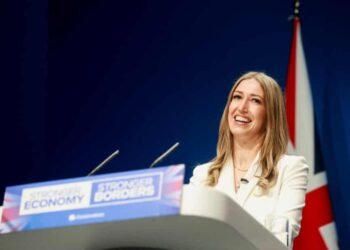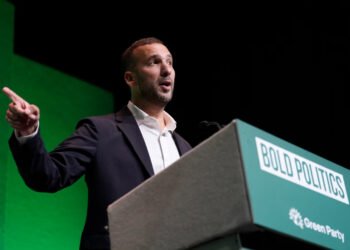With less than three weeks until Britain’s election day, Prime Minister Rishi Sunak faces a critical challenge to alter the bleak outlook for his Conservative Party.
He is under increasing scrutiny as questions mount about whether voters will terminate his tenure abruptly on July 4.
Polls persistently show the left-of-center Labour Party, led by Keir Starmer, maintaining a double-digit advantage over Sunak’s Conservatives.
The party has held power for 14 years under five different prime ministers. However, Sunak’s efforts to narrow this gap appear to be floundering.
The most notable moment of his campaign thus far was a misstep: his decision to skip an international ceremony in France on June 6 commemorating the 80th anniversary of the D-Day invasion. He has been issuing apologies ever since.
Commentators are beginning to discuss dire scenarios for the Conservatives, who have governed Britain for nearly two-thirds of the past century and secured 365 of the 650 seats in the House of Commons in the 2019 election.
John Curtice, a highly respected polling expert and professor of politics at the University of Strathclyde, noted that Conservative support is at an all-time low in UK polling history, suggesting Sunak “must be beginning to doubt his decision to call the election early.”

In the past week, both Conservatives and Labour unveiled their election manifestos, detailing their promises to the electorate.
The Conservatives are concentrating on reducing immigration and cutting taxes, pledging £17 billion ($22 billion) in tax cuts by 2030, primarily funded by reducing welfare costs.
Labour, on the other hand, is focusing on revitalizing the economy after years of stagnation by introducing a new industrial policy, investing in infrastructure, streamlining planning regulations, and building 1.5 million new homes.
The party has vowed not to increase personal taxes, though Conservatives argue that Labour’s policies will inevitably lead to higher tax burdens.
Critics contend that neither party is addressing the necessary tax hikes required to restore public services strained by years of Conservative-led budget cuts, Brexit, the global pandemic, and the cost-of-living crisis sparked by Russia’s 2022 invasion of Ukraine.
“The glaring omission in both parties’ manifestos is an acknowledgment of the magnitude and severity of the fiscal challenges that will face the next government,” said Hannah White, director of the independent think tank Institute for Government.
Farage Threatens Conservative Vote, Labour Urges Vigilance
The Conservatives’ electoral difficulties were exacerbated when Nigel Farage, a populist firebrand, entered the race leading the right-wing Reform UK party.
While Reform UK is unlikely to win many parliamentary seats, its rising vote share appears to be eroding support for the Conservatives.
In recent days, the Conservative narrative has shifted from pursuing victory to cautioning that voting for Reform UK could hand Labour a landslide victory.
“If you vote for anybody else other than a Conservative candidate, you’re going to get a Labour government with a large majority,” Transport Secretary Mark Harper warned on Sunday, June 16.
Meanwhile, Labour is wary that its supporters might become complacent, assuming the election is already decided, and fail to turn out on polling day.
Health spokesman Wes Streeting warned on Sunday of “breathtaking complacency in the media” regarding Labour’s lead in the polls.
Sunak, who has been in office for less than 20 months, remains resolute in his determination to win.
Britain’s first Hindu prime minister emphasizes that he is guided by the concept of dharma, which he interprets as “doing your duty without focusing on the outcomes.”
“Work as hard as you can, do what you believe is right, and try, and what will be will be,” he stated.





















